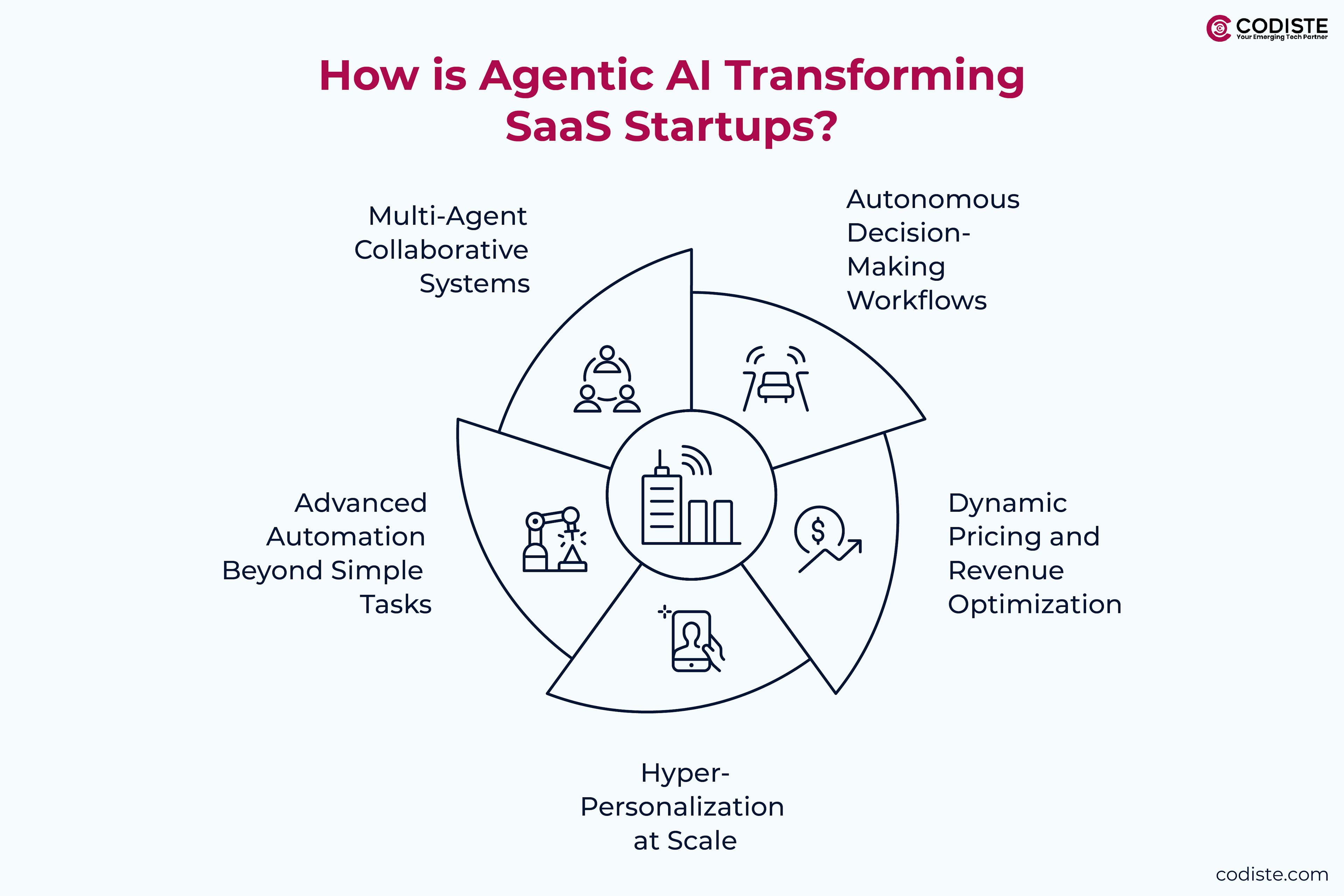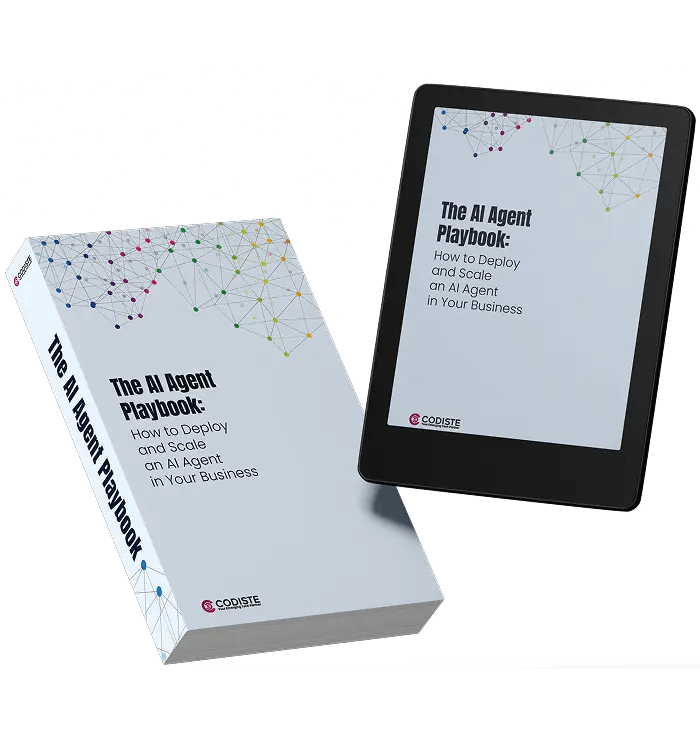


A new paradigm is emerging in the quickly changing AI agents space that has the potential to drastically alter how companies develop, implement, and expand their solutions. We are talking about agentic AI development for SaaS (software-as-a-service). For progressive SaaS organisations, agentic AI and artificial intelligence systems that can make decisions and take action independently can prove to be a match made in heaven. Further in this article, we will find out how these two go hand in hand and the global implications of AI agent technology powering the SaaS domain and proving to be a competitive advantage.
Software-as-a-Service (SaaS) is a software distribution and licensing pattern in which customers subscribe to centrally hosted programs on the cloud. Next-gen SaaS solutions eliminate the need for complex deployments or hardware investments, as opposed to traditional software, which must be installed and maintained locally.
While the concept of remotely hosted programs dates back to the 1990s, application service providers (ASPs), the term "SaaS" gained popularity in the early 2000s. Modern SaaS differs from these earlier methods because of its scalability, multi-tenant design, and focus on the constant release of new services. Further below, we will see how SaaS AI integration will shape the future of startups.
Beyond conventional AI implementations, agentic AI represents a substantial advancement. While traditional AI systems are very good at identifying patterns and making predictions, agentic systems go one step further by establishing objectives, choosing courses of action, and carrying out tasks with little human assistance.
Next-gen SaaS solutions can benefit from agentic AI development by making software that does more than just react to orders; it can also solve problems on its own in the following ways:
Instead of creating tools that need continual human guidance, SaaS businesses can now create solutions that work as self-sufficient digital collaborators, managing intricate tasks on their own while adjusting to novel problems. This is a significant change.
Agentic AI integration is having a cascading effect on the SaaS ecosystem, allowing entrepreneurs to provide previously unheard-of value in several crucial areas:

Agentic AI development for SaaS platforms can now manage intricate workflows that previously required human judgment. Marketing tools may modify campaigns in response to real-time performance data, supply chain management systems can optimise inventory without human interaction, and customer support platforms can escalate issues automatically.
For instance, without the need for a customer success manager to start the process, an agentic CRM system may detect a trend of customer unhappiness, pinpoint the underlying cause in product usage data, and proactively contact at-risk consumers with tailored solutions.
Pricing strategy is among the most significant areas where agentic AI is being used. Conventional SaaS price structures frequently don't change for months or years. However, agentic systems can:
Tech giants with extensive data science teams were the only ones with this degree of pricing knowledge in the past. Even firms in their early stages can now employ smart pricing techniques that consistently maximise profits.
Personalisation has historically been the ultimate objective of SaaS, although agentic AI elevates this concept by facilitating authentic one-to-one interactions, leading the way with next-gen SaaS solutions without the need for manual configuration:
Consequently, SaaS firms experience a significant increase in engagement and retention metrics as a consequence of the software's custom-built feel for each user.
Automation is progressing well beyond basic rule-based jobs thanks to agentic AI. Complex procedures that once required specialised knowledge can now be handled by today's systems:
For SaaS firms with little engineering staff, this degree of automation is especially helpful because it speeds up development cycles and decreases dependencies.
The most intriguing development is perhaps the rise of collaborative multi-agent systems, in which specialised AI agents cooperate to achieve challenging objectives:
With this modular approach, SaaS businesses may combine specialised AI capabilities to create complex solutions that improve interoperability and scalability.
Make autonomous AI agents work in coordination for your organisation now.
To successfully integrate agentic AI, entrepreneurs and developers must take into account several strategic factors:
To get started, you should first map out your existing workflows and identify the procedures where:
Typically, the return on investment (ROI for the adoption of agentic AI is strongest in these areas.
Implementing agentic AI in stages is preferable to attempts to fully automate complex operations all at once.
Through the use of this progressive strategy, you mitigate risks while simultaneously increasing organisational confidence in AI systems.
Transparency is necessary for users to have faith in agentic systems:
Not only can transparent systems contribute to the development of trust, but they also make learning and improvement more efficient.
Agentic AI does well when it can be adept at learning from its interactions:
Your AI agents will continue to evolve in order to satisfy the ever-changing demands of your business, thanks to these feedback systems.
Read more:
Ultimate AI Agent Development Guide for Businesses in 2025
Mastering AI Agents in Marketing and Boosting Brand Growth
Choosing Between Chatbots and AI Agents, What Does Your Business Need?
Why Your Business Needs an AI Voice Assistant – And How to Get Started
7 Foolproof Steps to Launch Your AI Agent with Ease
You should reconsider your pricing strategy when agentic AI affects the way you deliver value:
In order to differentiate your offering in the market and capture the additional value that is created by agentic systems, unique pricing models might be of great assistance during this process.
How do you move from AI experiments to enterprise-wide impact?

Although there is a tremendous amount of potential in agent-based AI systems, SaaS firms must overcome many obstacles:
It's still critical to strike the correct balance between AI autonomy and human supervision. Even if ordinary operations become entirely automated, human approval may still be necessary for critical decisions. Implementations that are successful usually have bounds for autonomous activity that are well-defined.
Agentic systems can reinforce preexisting biases by learning from past data. For SaaS firms to guarantee that their AI agents make just and equitable decisions, they must have strong data governance procedures and bias detection tools in place.
Controlling expectations is essential when consumers engage with more complex AI entities. Building long-lasting trust and avoiding disappointment are two benefits of open communication about AI's potential and limitations.
The regulatory environment on self-governing AI systems is constantly changing. SaaS firms that are in front of the competition are developing compliance frameworks that can adjust to new rules, especially those about accountability and transparency.
Agentic AI development for SaaS startups not only represents a paradigm shift for building next-gen SaaS solutions that elevate how progressively enterprises are moving but will also simultaneously create autonomous systems that proactively deliver value. This transition is guaranteed to offer unprecedented opportunities for efficiency, personalization, and innovation.
Soon, the most successful SaaS startups will be those that thoughtfully integrate agentic capabilities while maintaining appropriate human oversight. By starting with high-value use cases, implementing hybrid approaches, and building robust feedback mechanisms, even early-stage companies can begin harnessing the transformative power of agentic AI.
As we look to the future, one thing is certain: the line between software as a service and software as a teammate is blurring. For SaaS founders and developers willing to embrace this new paradigm, the potential for creating revolutionary products has never been greater.
It's an opportunity for every entity to capitalize on this opportunity; better late than never, we at Codiste can help you gain the momentum you need to hop on this journey. To know more about this, click here. To read more about such interesting industry-related developments, you can sign up with us.




Every great partnership begins with a conversation. Whether you’re exploring possibilities or ready to scale, our team of specialists will help you navigate the journey.